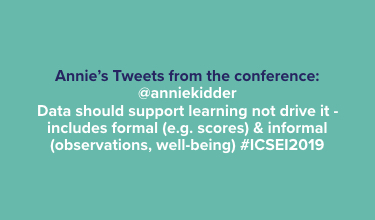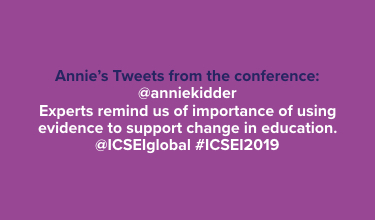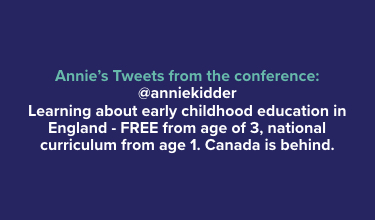What role does education research
play in this “post-truth” era?
By Annie Kidder, Executive Director, People for Education
|
“Children with strong self-regulation skills are able to ‘grab’ learning.” |
“There is a strong connection between the quality of a 3 year-old’s pre-school and that same student’s social-emotional skills when they are 11.” |
“These ethnic studies courses had an impact on student behaviour and academic outcomes.” |
 These are just some of the findings from a recent education research conference in Norway. At the 21st annual International Congress for School Effectiveness and Improvement (ICSEI), education experts from around the world shared research, described innovative programs, and shone a light on evidence about what makes a difference. The researchers looked at everything from early childhood education to the international crisis in educating refugees. Here are some of the research highlights:
These are just some of the findings from a recent education research conference in Norway. At the 21st annual International Congress for School Effectiveness and Improvement (ICSEI), education experts from around the world shared research, described innovative programs, and shone a light on evidence about what makes a difference. The researchers looked at everything from early childhood education to the international crisis in educating refugees. Here are some of the research highlights:
Paying attention to pre-school
A British study tracked 3000 children from pre-school through to graduation. Among the findings:
- Children who participated in early years education (3 and 4 year-olds) had higher English and mathematics results on exams given when students are 16, compared to students who did not pre-school.
- Children who attended high-quality pre-school programs were better at self-regulation, social behaviour and less inclined to hyperactivity.
- Children who experienced high-quality pre-school settings were more likely to follow an academic path at 16 years-old.
Professional collaboration is one of the keys to great schools
According to Amanda Datnow, “Data can be used for good or evil.”
Datnow is an expert in data use and collaboration. She says that “accountability-driven culture, focused on student test scores, tends to have a short-term time frame and excludes teacher and principal voices”, whereas true professional collaboration goes “well beyond these measures and include[s] teacher-created assessments, curriculum-embedded assessments, writing portfolios, results from student work with online instructional tools, and of course [teachers’] own observations of student learning.”
She describes Chavez Elementary School in San Diego where the teachers and principal create one-page documents to describe what collaboration, assessment, and data analysis “look like” at the school. According to the principal, “Every year we rip it apart” and revise it. The team comes back together to agree on the new framework and that “this is what we endorse, and we’re going to hold each other accountable for it.” Teachers are also provided with release time three times a year (above and beyond their monthly collaboration time) to work in teams (with one grade below and one grade above) to talk about every child in the school.
According to Datnow, there must be policy in place to recognize the importance of time for high-quality collaboration, and one of the jobs of principals is to protect that time. She says that when the collaboration is real, ongoing, and a community effort, it leads to equity and excellence for students and teachers.
The role of unions in supporting excellence in education
In 2014, the Alberta Teachers’ Association, the Norway Teachers’ Union, and the Ontario Teachers’ Federation established the Norcan Partnership – a collaboration among 9 schools from Alberta, Ontario, and Norway. The goal was to research ways to improve student learning in mathematics. The project was based on the idea of professional autonomy, and tested ideas about teacher and principal collaboration, as well as students’ participation in designing school policies. Teachers and students visited each other’s schools, learned from each other, and changed practices. The research found that the project built students’ leaderships skills, and improved both student engagement and success.
Is there a gap between evidence and policy in education?
 It was heartening to listen to experts talk about research and describe projects from around the world that are improving students’ outcomes in everything from math, to citizenship, to social-emotional skills. But the question remains: does “the evidence” always translate into policy? And is it supported in schools on the ground?
It was heartening to listen to experts talk about research and describe projects from around the world that are improving students’ outcomes in everything from math, to citizenship, to social-emotional skills. But the question remains: does “the evidence” always translate into policy? And is it supported in schools on the ground?
There’s lots of scientific evidence about climate change, about eating healthy food, and about the cost-effectiveness of focusing on prevention and promotion in health. But politics can get in the way of enacting policy based on the evidence.

At academic conferences, participants often say “we know x or y”, but if we really do know, then why is it so hard to get the policy we need to support what the experts say makes a difference?
It’s time to do a better job connecting the dots between the academics, the people trying things on the ground, the policy-makers, the public, and the politicians.
If the public knew more about what works – about what the research shows – then we would know what changes to be asking for in our schools.
Further reading:
- Learn more about our research on quality learning environments and how professional collaboration supports student learning.
- Find out more about the role of Early Childhood Education in supporting the development of transferable skills.
